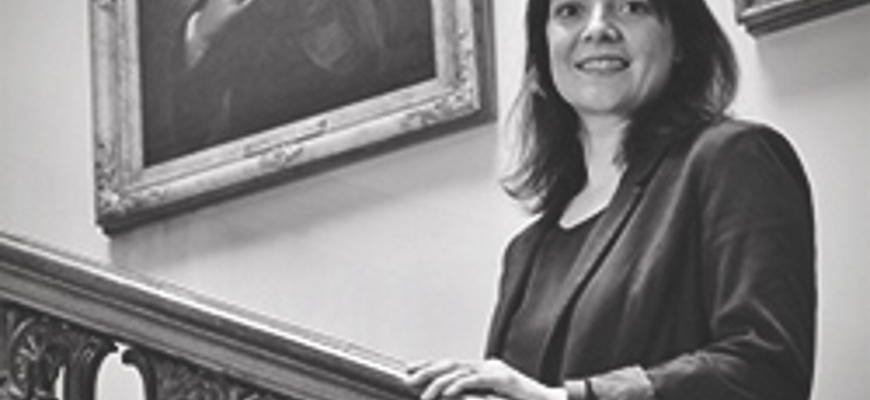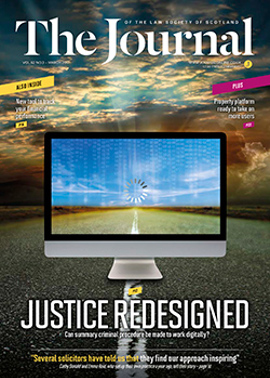Back to university

Where do you come from and what was your career path to your current position?
I was born in Edinburgh and brought up in Penicuik, Midlothian. I studied at the University of Edinburgh and trained at Dundas & Wilson in the city (with a brief stint in London for one of my seats). I had a previous in-house experience fairly early on in my career, at a small medical devices company, but otherwise worked in private practice at a variety of firms for around 12 years before moving to my current position.
Following qualification I specialised in intellectual property work, becoming a Law Society of Scotland accredited specialist in intellectual property law, and this work brought me into close contact with a number of higher education institutions in Scotland including the University of Edinburgh. I was always inspired by the work that went on in the sector and, as an intellectual property lawyer, it is fantastic to be dealing with cutting-edge innovators and academics so enthusiastic about their research.
How is your in-house legal team structured? What input do you have in strategy and governance?
The structure of the in-house Legal Services team at the University of Edinburgh has evolved significantly in the past couple of years. When I joined the university there were no in-house solicitors but there were a number of solicitors in Edinburgh Research and Innovation Ltd, a wholly owned subsidiary of the university which supports its research and commercialisation activity. Those lawyers joined me in the early part of last year and we are now a team of nine practising solicitors supported by a legal administrative team.
We do not currently recruit trainees, but we do recruit interns, law students, from the university’s internship programme.
The interns shadow us and are tasked with specific projects which gives them a bit of understanding of operating in a small practice.
The team works very closely with the university’s Governance and Strategic Planning unit and also with senior management of the university, and it is important for our advice to be strategic. We strive to work in partnership with our colleagues at the university and not just as providers of legal advice. I attend the University Court (the university’s governing body) and some of the University Court committees where the key strategic decisions about the university are made, so Legal Services has a voice in these forums and an input into strategy.
What is a typical working day? What motivates you on a Monday morning?
I have read lots of your interviews with in-house lawyers and I think the response to this question is usually that there is no such thing as a typical working day. While it might sound trite, it is very true. The university has a community of around 50,000 people, so there is no telling what any given day will bring. It could be working with colleagues to secure funding for groundbreaking research projects, supporting colleagues working hard on our extensive capital programme, or dealing with the wide array of regulatory, legislative or compliance matters that impact the university. It’s incredibly varied. I can be dealing with a major strategic project in the morning and complex student and staff issues in the afternoon.
What was the biggest change for you when you moved in-house? And what do you really enjoy about working in-house?
The biggest change for me was having to deal with such a wide array of legal issues and not having specialist teams on hand, like in private practice, to refer work to. However, that is also the biggest attraction of my post. I really enjoy the diversity and the challenge, and it’s pretty handy having a fantastic law library and amazing online resources at our fingertips.
Has your organisation experienced any major change recently? What are the current hot legal topics in your sector?
The university, like many organisations, is heavily impacted by the political environment. We also have to grapple with existing and new legislation and embrace the global presence and impact of the university, which makes for a very diverse portfolio.
What is your most unusual or amusing work experience?
I would say starting work for the university and working on the opposite side of the Old College Quad from the Law Faculty where I once studied. I visited the law library quite early on, and it was quite nostalgic seeing the students chatting and cramming for exams and thinking back to when I was in their shoes. I find working in Old College inspiring. The building itself is historic and very grand, and is filled with amazing paintings and sculptures. The Quad is used by the university and by the community for a variety of events including the Fringe, and the always popular Edinburgh Legal Walk in October each year usually starts in the Quad with some great photo opportunities! It has also been used as an open air cinema, exhibited the Kelpie maquettes, and one of my earliest experiences at work here was seeing the terracotta warriors lit up in the Quad. It was overwhelming!
What makes a good in-house lawyer, in your sector in particular? What is your career advice for young lawyers who want to start an in-house career?
A good in-house lawyer has to be prepared to embrace significant challenge and roll their sleeves up and get on with it. It is extremely important to trust your own judgment and be prepared to make a call on things. You are not just giving advice – you also have to act on it and see things through to the end with your colleagues. My advice to anyone wanting to start an in-house career is to be brave. Don’t be daunted by areas of law you think you know nothing about – you’ll know more than you think. Have confidence, and importantly build strong relationships with your colleagues.
Does Scottish legal education and training provide the necessary skills for working in-house in your organisation?
Yes, although I am dual qualified and that can help when dealing with English solicitors. I work in fields which are similar throughout the UK and internationally, and Scots law is well regarded. I think more work could be done on the practical application of legal knowledge. This has certainly improved, but it is key for lawyers to be career-ready. I think there is quite a difficult transition to make from law student, where there is much more emphasis on legal interpretation and analysis and how to present a series of propositions, to being a practising solicitor. Clients want advisers to understand their perspective and look for pragmatic, risk-based advice: How can I apply that? What are the risks if this course of action is taken? Universities are aware of this and a lot of work is being done. I think the ILC seminars pitched at different levels can also help.
What are the key challenges for you and your team in 2017? How does the future look for in-house lawyers?
I think the future looks bright for in-house lawyers. More and more organisations are realising the value of having their lawyer as part of the team, and being part of the team enables in-house lawyers to gain a wider and deeper understanding of what matters to the organisation they are in. That understanding adds significantly to the quality of the legal advice that can be given.
What do you look for when you seek external legal advice from solicitors? How do you see the in-house/external legal relationship changing?
The university works with a panel of external legal firms. I consider these firms to be an extension of the in-house team, so close working relationships are essential. The relationship should be one of mutual support and respect.
Have you seen the profession develop in terms of diversity since you qualified?
Diversity is a key strategic objective of the university and we work hard to create an environment which fosters diversity and inclusion across the entire university community – staff and students. I think the legal profession in general has made some inroads here but I suspect more could be done, particularly at the upper levels of the private practice profession.
How does your team use technology solutions to help with its work? What has your team done that is innovative?
We have an excellent Information Services department that supports innovation throughout the university, and are currently exploring various systems to improve our internal working practices. We are a relatively new team and these things take time, but we operate in an extremely innovative and leading learning environment and it is our intention to make the most of what is available to us.
What keeps you busy outside the office?
Definitely being with my family. I have two young children, so there is never a dull moment.
In this issue
- Ineligibility – an open and shut case?
- Rent deposits – filling in the gaps
- EU at the crossroads
- Brexit: the human rights dimension
- Reading for pleasure
- Opinion: Andrew Lothian
- Book reviews
- Profile
- President's column
- Digital consultation closes
- People on the move
- Clear sky over summary courts
- Defence submissions
- Bookmark the benchmark
- GDPR: Practical steps for Scottish law firms to prepare
- Heads for business
- Spousal visas and the income rule
- Compete or get beat
- Platform party
- The consequences of excluding consequential loss
- Understanding the other side's position
- Family complexities
- Unitary patent: sunrise or sunset for UK holders?
- Third option
- Land reform, step by step
- Member against member?
- Scottish Solicitors' Discipline Tribunal
- Power of attorney update
- The 2012 Act: a bold step forward?
- Back to university
- Accreditation: calling regulatory lawyers
- Law reform roundup
- Street Law shows the way
- Year of big news
- De-risking email
- Paralegal pointers
- Ask Ash
- Top of the list
- Just your luck?
- Executries and pension overpayments






